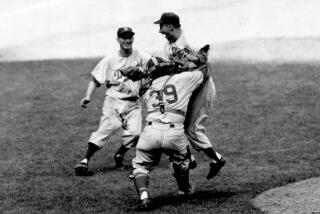Cox vs. Hargrove : The 1995 World Series Offers a Clash of Managerial Styles
- Share via
ATLANTA — This World Series has come down to the two best teams in baseball, despite the best efforts of the sport’s proprietors to dilute the game with gimmickry at every turn.
Wild cards notwithstanding, we got Cleveland and Atlanta, the winningest teams in each league, which is the way it was supposed to be all along.
Good teams don’t get that way by accident. They are shepherded over the speed bumps and potholes of the marathon season by managers who know what they’re doing. And the Braves and Indians are blessed with two of the best in Bobby Cox and Mike Hargrove.
They both arrived at the Series with reputations.
Cox is a players’ manager, loyal to his guys. He probably flashes more swing signs on 3-0 pitches than anybody in the game and his hitters love it. In Game 4 of the National League playoffs against Cincinnati, leading 1-0 with a man on third and none out, he let No. 2 hitter Mark Lemke swing away with Chipper Jones and Fred McGriff behind him. Lemke popped up. No matter. Sooner or later, Cox probably will do the same thing again. He trusts Lemke and the rest of his lineup that much.
Hargrove is more conservative, more predictable. When reliever Paul Assenmacher struck out Ken Griffey, Jr. and Jay Buhner in a tight spot in Game 5, of the American League playoffs, grandstand managers thought Hargrove would stick with him. No way. He went right to Eric Plunk to set up closer Jose Mesa, because that’s what he’d done all season. Mesa pitches one inning, no more, no matter what the circumstances. The same thing happened in Game 6 with Dennis Martinez, working on a shutout, lifted after seven innings for Julian Taveras, and the ninth was left for Mesa.
If you want to know about managers, ask other managers.
Marcel Lachemann, who took the California Angels to a playoff for the AL West title, worked against Hargrove. Rene Lachemann, Marcel’s brother, who manages the Florida Marlins, operates against Cox.
“To a degree, because of their lineup, people think Mike is a pushbutton manager,” Marcel Lachemann said. “But you know, he was supposed to win and he did. That might be a little harder. He met all the expectations and went beyond them. I thought he was the Manager of the Year.”
Lachemann admired the way Hargrove prepared his team.
“He’s sharp and he knows what he wants to do,” he said. “The way he set up his bullpen with Assenmacher, Plunk, Taveras and Mesa. He molded that club together. They came from behind a whole bunch of times. That’s not blowing people out. They’re a very well-prepared team. They pick up signs at second base very well, and they’ll tip off their hitters. Hey, why shouldn’t they? It’s legal.
“They have good advance scouting, but you have to complement it to make it work. What they did to (Mo) Vaughn and (Jose) Canseco and both Martinezes. You have to admire them.”
Cleveland pitchers blanked Boston sluggers Vaughn and Canseco in the first round of playoffs, leaving them at 0-for-27 in three games. Batting champ Edgar Martinez and Tino Martinez didn’t do much better for Seattle in the pennant playoffs at a combined 5-for-45.
Good preparation. Good execution. That’s Hargrove’s style.
According to Rene Lachemann, Cox is less predictable.
“He takes what the opposition gives him,” he said. “He does things now that he doesn’t do during the season. He’s a guy who goes with gut feelings. He’ll use guys off his bench.”
So people like Mike Devereaux and Charlie O’Brien emerged as hitting heroes against Cincinnati. They were hunches that paid off for Cox.
Lachemann’s advice is don’t blink. You never know what Cox will come up with next.
“You have to be careful with him. He’ll squeeze. He’ll do what he hasn’t done before. He’s on top of the game. Sometimes, you’ll sit back and say, ‘No way he’ll run here,’ and then bam, there’s the hit-and-run.
“Every mistake you make, they’ll score runs. He’ll lull you to sleep and then he’ll hit you with a sledgehammer.”
So we have the predictable vs. the unpredictable, the prepared vs. the impromptu. Stay tuned. This could be interesting.
More to Read
Go beyond the scoreboard
Get the latest on L.A.'s teams in the daily Sports Report newsletter.
You may occasionally receive promotional content from the Los Angeles Times.










